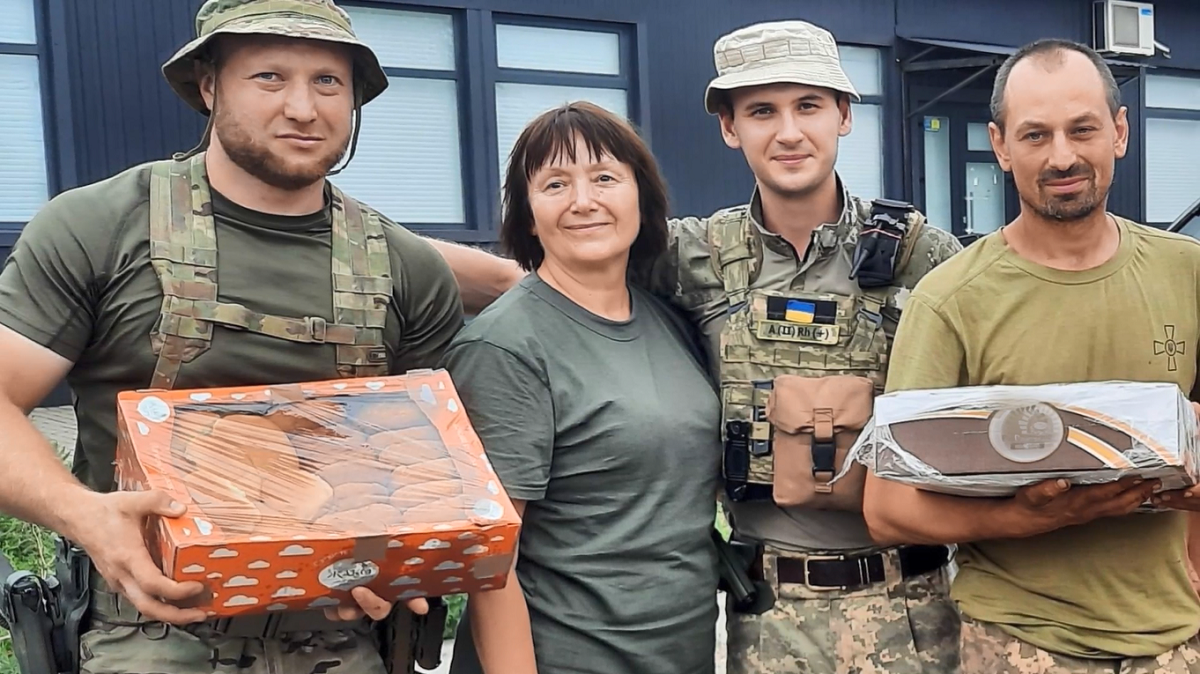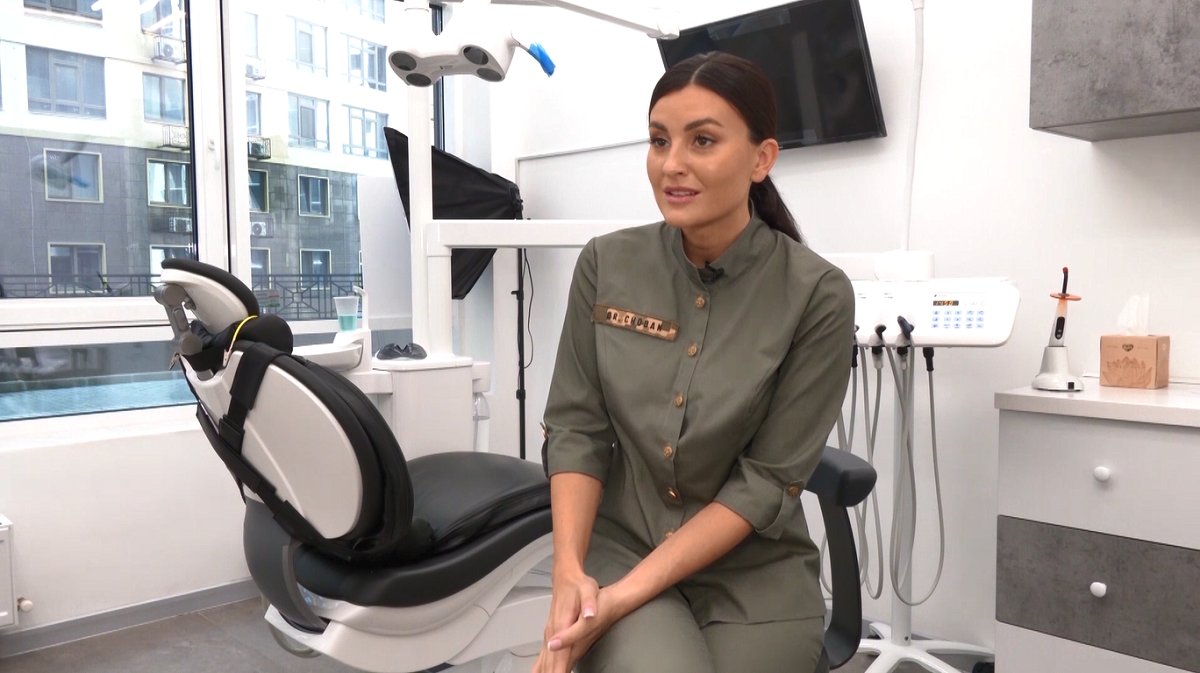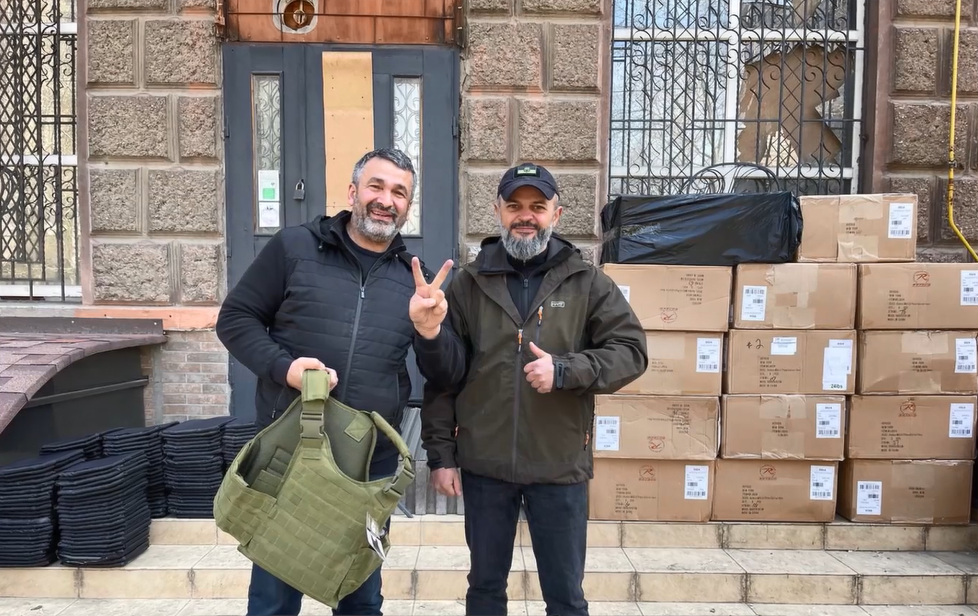Листопад 11, 2022
Відчинили свої «Двері»: проєкт Суспільного про представників нацспільнот, які допомагають постраждалим від війни
13 листопада о 16:00 на місцевих телеканалах Суспільного Мовлення* стартує проєкт Координаційного центру мовлення національних меншин «Двері», де українці різного етнічного походження, діляться зворушливими історіями про допомогу тим, хто рятується від війни. Також проєкт «Двері» виходитиме у національному марафоні «Єдині новини #UAразом», на телеканалі Суспільне Культура та ютуб-каналі Першого.
Це 16 документальних історій про людей, життя яких змінила повномасштабна війна, та про врятовані ними сім’ї. Як згуртувалися та волонтерять, як відчинили двері своїх домівок для переселенців — попри національну приналежність, мову, культуру та місце проживання, кожен з героїв проєкту своїми справами наближає нашу спільну перемогу.
Читайте також: Історія українського болгарина Іллі Златова у «Відтінках України. Війна»
«У цих історіях реальне життя українців — тих, що відчинили двері своєї домівки для тих, чий дім довелось умістити у валізу. Ми зафіксували для себе і для глядачів ці найсильніші враження — зустрічі з різними українцями, які огортають своїм теплом. Надломлені, крихкі й міцні водночас. Наші герої — нащадки вимушених переселенців з інших країн. Вони добре пам'ятають непрості історії життя своїх родичів і факти про те, як одного дня українська земля відчинила свої двері для них, і тепер питання допомоги вимушеним переселенцям з інших регіонів країни для них особисте і надважливе. Вони не очолюють волонтерських організацій, не займають високих посад, не є відомими особистостями — вони Українці, від яких можна заряджатись, як від генератора посеред темної ночі», — розповіла керівниця Координаційного центру мовлення національних меншин Суспільного Анастасія Гудима.
Перший випуск складається з трьох історій героїв різного етнічного походження з Одещини. Серед них розповідь Олександри Корчинської, вчительки фізики з польським корінням із селища Маяки. Жінка створила волонтерський хаб.

«Для мене війна розпочалася у 2014 році. Я зрозуміла, наскільки це важливо — відстояти Україну, — розповідає Олександра Корчинська, — після повномасштабного вторгнення я змінилась. До війни я була просто мирна людина, а зараз воюю за наших хлопців. Треба тим, хто на фронті, допомагати. Варіант один — залучати більше людей до цього, бо один в полі не воїн. Робити добро — дуже легко. Хочу, щоб Україна процвітала, щоб вона була вільна. Чим швидше вигнати росіян, ось такими справами. Тому що допомагати разом — це перемагати разом».
Ще одна історія — стоматологині Наталі Чобан з Одеси, болгарського й гагаузького походження, яка відкрила двері свого стоматологічного кабінету для військових і вимушених переселенців, та розповідь азербайджанця Фазиля Аксєрова, який прихистив вимушених переселенців і передав на передову понад 100 бронежилетів та 10 автомобілів.


Креативна продюсерка Координаційного центру мовлення національних меншин Суспільного Олена Кривенко розповіла, назва «Двері» — метафорична.
«Вислів однієї з героїнь проєкту для мене влучно описує його суть: "Допомагати — значить перемагати". В кожній програмі ми розповідаємо про небайдужих людей, які працюють на різних фронтах, аби Україна якнайшвидше перемогла у цій жахливій війні з агресором. Хтось лікує зуби безкоштовно, хтось приймає переселенців у власному будинку, хтось передає варення на фронт, хтось збирає гроші на автівки для військових. Історії Волонтерів з великої літери ми зібрали у шести випусках програми, які на ютубі будуть у 16-ти окремих історіях. "Двері" — це чергове свідчення незламності та згуртованості української нації», — каже Олена Кривенко.
Читайте також: «Жодна імперія не вижила в історії, і ця не виживе»: Йосиф Зісельс дав прогноз на майбутнє росії
Редакторка проєкту «Двері» Надія Стадницька поділилася, що проєкт та його герої стали для неї справжнім відкриттям.
«Тепер знаю: коли одні двері зачиняються, обов'язково відчиняються інші. Багато людей втратили власні домівки, але знайшли новий прихисток. Втратили рідних, але здобули друзів на все життя. Проєкт "Двері" — відкрив перед учасниками не лише двері у новий дім, а й двері у нове життя, дав надію, віру і силу боротися проти росії. Проєкт “Двері” вкотре довів, що Україна єдина. Українці з Заходу країни відкривають свої домівки для українців зі Сходу країни, незалежно від віросповідання, національності — ми всі українці та живемо на своїй землі — тому перемога буде за нами й квітуча Україна відродиться», — переконана Надія Стадницька.
Суспільне мовлення — єдине медіа в Україні, яке регулярно виготовляє проєкти мовами національних спільнот — для них, а про них — українською. У 2019 році був створений Координаційний центр мовлення національних меншин. Команда Центру збирає інформацію з усіх куточків України про найважливіші для кожної спільноти події, виклики та проблеми, прагне створити середовище рівності, толерантності та плюралізму нацменшин.
Суспільне Мовлення — найбільше незалежне медіа в Україні, до якого входять загальнонаціональні телеканали Перший та Суспільне Культура й канали Суспільного радіо (Українське Радіо, Радіо Промінь, Радіо Культура), а також 24 місцеві телерадіокомпанії.
* Крім Суспільне Крим та Суспільне Донбас.
We open our Dveri (Doors): the project of Suspilne about representatives of national communities who help victims of war
On 13 November at 16:00, the project Dveri (Doors) of National Minority Programming Coordination Center will be launched on local TV channels of Suspilne Ukraine*, where Ukrainians of various ethnic origins will share touching stories about helping those fleeing the war. Also, Dveri (Doors) project will be broadcast in the national telethon United News #UArazom, on Suspilne Kultura TV channel and Pershyi YouTube channel.
These are 16 documentary stories about people whose lives were changed by full-scale war and the families they saved. How they rallied and volunteered, how they opened the doors of their homes for displaced people, despite their nationality, language, culture and place of residence, each of the characters of the project brings our common victory closer with their actions.
“These stories show the real life of Ukrainians, those who opened the doors of their homes to those whose homes had to be placed in a suitcase. We recorded for ourselves and for the audience these strongest impressions, namely meetings with various Ukrainians who enveloped us with their warmth. Broken, fragile and strong at the same time. Our characters are descendants of forced immigrants from other countries. They well remember the difficult life stories of their relatives and the facts about how one day the Ukrainian land opened its doors for them, and now the issue of helping displaced people from other regions of the country is personal and important to them. They do not head volunteer organizations, do not hold high positions, are not well-known personalities, they are Ukrainians who can charge us like a generator in the middle of a dark night,” Anastasiia Hudyma, the Head of the National Minority Programming Coordination Center, said.
The first episode consists of three stories of characters of different ethnic origins from Odesa region. Among them is the story of Oleksandra Korchynska, a physics teacher with Polish roots from the village of Maiaky. The woman created a volunteer hub.
“For me, the war began in 2014. I realized how important it is to defend Ukraine, — Oleksandra Korchynska says, — after the full-scale invasion, I changed. Before the war, I was just a peaceful person, but now I fight for our boys. It is necessary to help those who are at the front. One option is to involve more people in this, because one is not a warrior in the field. Doing good is very easy. I want Ukraine to prosper, to be free. The sooner the russians are expelled, the better. Because helping together means winning together.”
Another story is about Natali Choban, a dentist from Odesa, of Bulgarian and Gagauz origin, who opened the doors of her dental office for military personnel and forced migrants, and the story of Azerbaijani Fazil Akserov, who sheltered forced migrants and handed over 100 bulletproof vests and 10 cars to the front lines.
Olena Kryvenko, the Creative Producer of UA: PBC’s National Minority Programming Coordination Center, said that the title Dveri (Doors) is metaphorical.
“The saying of one of the characters of the project aptly describes its essence for me: “Helping means winning.” In each programme, we talk about caring people who work on different fronts so that Ukraine wins as soon as possible in this terrible war with the aggressor. Some treat teeth for free, some host IDPs in their homes, some send jam to the front, some collect money for cars for the military. We collected the stories of Volunteers with a capital letter in six episodes of the programme, which will be on YouTube in 16 separate stories. Dveri (Doors) is another proof of the indomitability and unity of the Ukrainian nation,” Olena Kryvenko says.
The editor of Dveri (Doors) project, Nadiia Stadnytska, shared that the project and its characters became a real discovery for her.
“Now I know that when one door closes, another one must open. Many people lost their homes, but found a new shelter. They lost relatives, but gained friends for life. Dveri (Doors) project opened for the participants not only the door to a new home, but also the door to a new life, gave hope, faith and strength to fight against russia. Dveri (Doors) project once again proved that Ukraine is united. Ukrainians from the West of the country open their homes to Ukrainians from the East of the country, regardless of religion, nationality, we are all Ukrainians and live on our land, therefore the victory will be ours and a flourishing Ukraine will be reborn,” Nadiia Stadnytska is convinced.
Suspilne Ukraine is the only media in Ukraine that regularly produces projects in the languages of national communities for them and about them in Ukrainian. In 2019, the National Minority Programming Coordination Center was established. The Center's team collects information from all corners of Ukraine about the most important events, challenges and problems for each community, strives to create an environment of equality, tolerance and pluralism of national minorities.
Suspilne Ukraine is the largest independent media in Ukraine, which includes the nationwide TV channels like Pershyi and Suspilne Kultura and radio stations of Suspilne Radio (Ukrainian Radio, Radio Promin, Radio Kultura), as well as 24 regional Suspilne channels.
* Besides Suspilne Krym and Suspilne Donbas.


